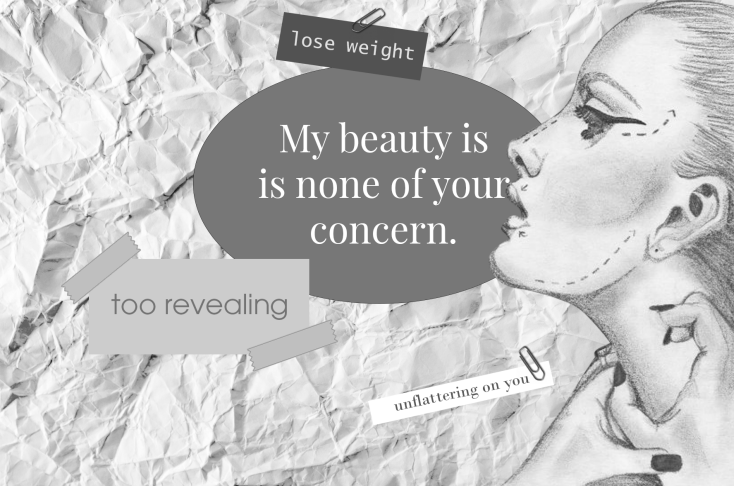Wan-take: Unsolicited critiques fuel social stigmas
The way clothing fits; the amount of skin that’s showing—these are some of the many concerns that people constantly have about their own bodies. Such worries are only amplified under society’s critical eye, looking to find the smallest discrepancies in someone’s appearance. Aside from well-meaning doctors and nutritionists, giving unsolicited comments about a person’s body is never appropriate, no matter the setting.
Especially in high school, commenting on the appearance of your peers is common practice, and often the first thing mentioned the moment you meet someone new. These comments may even be minor ones—talking about a piece of clothing or an accessory that the other person happens to have on that day. But, even then, it’s important to remember that, one, you may never know how your comments are going to affect someone and, two, it’s never your place to critique how someone looks.
I’ve seen my own classmates do it—make side comments, or, even, back-handed compliments about how that dress doesn’t quite seem to fit on that girl’s body or that those pants are a bit too short for their height. Some make even more blatant claims, talking about how someone looks too fat or plain ugly that day.
Granted, everyone is entitled to their own opinions and likely will make their judgments when meeting someone, but there’s no need to voice these opinions out loud, even if it’s about yourself.
Too often, you hear people making those exact claims about their very own body, wishing they had a little less fat protruding on their arms or hips. The very fact that either of those comments hold negative connotations is problematic enough, but to constantly project these comments around other people pushes the narrative that these are shameful traits that should be kept hidden—reinforcing the harsh stigmas surrounding what a body should, or shouldn’t, look like.
Others even see having a close relationship with someone as a free-pass to give random feedback on whatever they want whenever they want. Most evidently, at least for me, in familial relationships, especially that between mothers and daughters.
I can’t even count the amount of times I’ve walked past my mother just to have her instantly judge my appearance. It’s always something arbitrary—my shirt shouldn’t be tucked in that way; that tank is revealing just a bit too much skin; or, the more blunt ones, where she critiques a specific part of my body that she thinks needs changing.
Sure, these comments may be well-intentioned, but not once did I ask for them. Just because someone is a close friend or a family member, it doesn’t give them the right to comment on your appearance—especially if it’s something derogatory.
In fact, the only circumstance where it’s ever okay to provide such feedback to someone is if the other person is genuinely asking for advice on how something looks on them. Even then, it’s important to broach the topic with respect for the other person, keeping in mind that what you’re saying will affect them.
Even more so, you never know what a person may be going through, physically and mentally. It’s entirely possible that the person you’re speaking to has a body dysmorphic disorder or a mental illness and those negative comments could cause their downward spiral.
At the end of the day, commenting on how someone looks comes down to respect and drawing boundaries. If it’s not your body, then it’s none of your concern.
Your donation will support the student journalists of Diamond Bar High School. Your contribution will allow us to purchase equipment and cover our annual website hosting costs.



